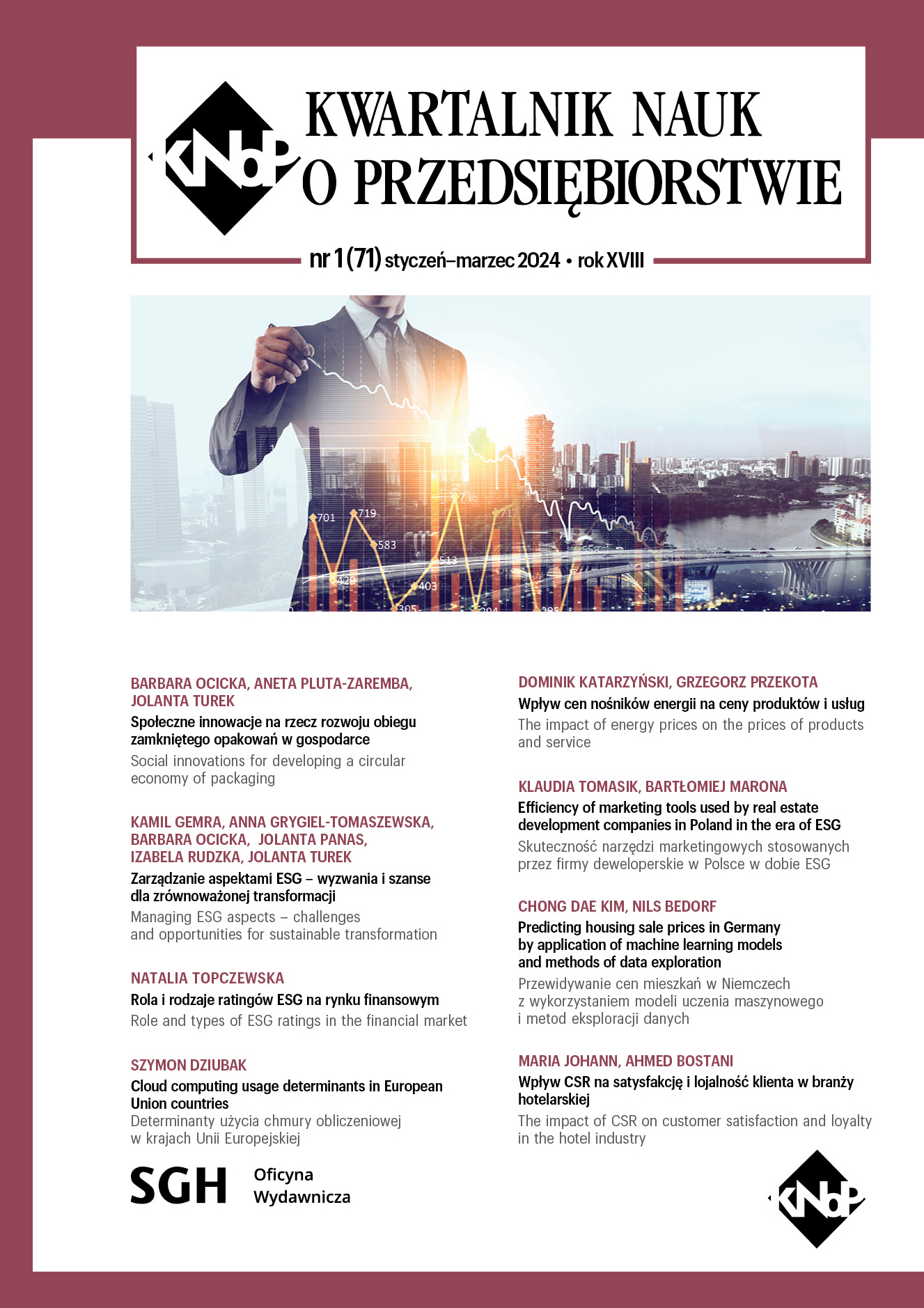Efficiency of marketing tools used by real estate development companies in Poland in the era of ESG
Main Article Content
Abstract
This study is a continuation of the consideration of marketing tools used by real estate development companies in Krakow. As a continuation of the study, it was decided to expand the scope to the whole country. The goal was to assess the efficiency of marketing tools appearing in the previous study by real estate development companies in Poland. The survey shows that the best performing marketing tools are still websites. It should also be noted the ever-growing popularity of social networking sites, which are also a very important marketing tool for developers. An important part of the marketing of real estate development companies is also the creation of visualizations of apartments. The use of this tool helps potential customers to imagine their own “M” in a better way than they would have to look at only the technical plans of the apartment in the ad. In addition, it is still a very efficient way to attract customers to use promotions, such as a storage unit in the price of an apartment. A side goal of the article was to test the application of ESG (Environmental, Social and Governance) principles in creating marketing strategies of real estate development companies in Poland. Some companies have changed or are planning to change their marketing strategy to be ESG-compliant, e.g. they are abandoning environmentally littering flyers and relying on online flyers, the same goes for abandoning billboards and posters in favor of advertising poles. Development companies in Poland are beginning to realize that customers increasingly view companies through the prism of ecology and pro-environmental activities.
Downloads
Article Details

This work is licensed under a Creative Commons Attribution 4.0 International License.
The author of the article declares that the submitted article does not infringe the copyrights of third parties. The author agrees to subject the article to the review procedure and to make editorial changes. The author transfers, free of charge, to SGH Publishing House the author's economic rights to the work in the fields of exploitation listed in the Article 50 of the Act of 4 February 1994 on Copyright and Related Rights – provided that the work has been accepted for publication and published.
SGH Publishing House holds economic copyrights to all content of the journal. Placing the text of the article in a repository, on the author's home page or on any other page is allowed as long as it does not involve obtaining economic benefits, and the text will be provided with source information (including the title, year, number and internet address of the journal).
References
Aytekin C., Demirli S. M. K. [2017], The role of social media in real estate marketing: A research on the transformation of real estate marketing in Turkey, „Öneri Dergisi”, vol. 12 (48), pp. 17–36, DOI: 10.14783/maruoneri.vi.331567.
Belniak M., Radziszewska-Zielina E. [2019], Effectiveness of Applying Marketing Tools in Real Estate Trading, „IOP Science Series: Materials Science and Engineering”, vol. 471 (11), DOI: 10.1088/1757-899X/471/11/112074.
CBRE Report [2023], Marketing zarządzania nieruchomościami. ESG zrównoważone aktywności marketingowe, https://f.tlcollect.com/fr2/423/98200/ESG_Handbook_PL.pdf?cbcachex=201065 (accessed: 18.10.2023).
Christian I., Nwaogu S. [2021], An analysis of the effect of online marketing on real estate disposal in nigerian property market, „International Journal of Scientific Research and Engineering Development”, vol. 4 (5).
Deloitte Report [2022], Real Estate Forecasts for 2022. Build a sustainable business and prepare for change by learning about real estate forecasts for 2022, https://www2.deloitte.com/pl/pl/pages/real-estate0/articles/prognozy-dla-rynku-nieruchomosci-na-rok-2022.html (accessed: 27.07.2023).
Dumpe M. [2015], Online Marketing Issues of Real Estate Companies: A Case of Latvia, „Baltic
Journal of Real Estate Economics and Construction Management”, vol. 3 (1), https://doi.org/10.1515/bjreecm-2015-0013.
Ferrell O. C. [2021], Addressing socio-ecological issues in marketing: environmental, social and governance (ESG), „AMS Rev”, vol. 11, https://doi.org/10.1007/s13162-021-00201–3.
Fosnacht K., Sarraf S., Howe E., Peck L. K. [2017], How important are high response rates for college surveys? „The Review of Higher Education”, vol. 40 (2), https://delighted.com/blog/averagesurvey-response-rate (accessed: 25.09.2023).
Maina C. [2017], Effect of digital marketing tools on performance of businesses in real estate sector in Nairobi county, Dysertacja doktorska – University Institutional Repository, https://repository.kcau.ac.ke/handle/123456789/416? show=full (accessed: 18.10.2023).
Martyniak M. [2015], Strona internetowa jako narzędzie sprzedaży i promocji oferty na rynku nieruchomości (Website as a tool for selling and promoting an offer on the real estate market), in: Woźniak M., Pilarz Ł. B., Drewniak M. (eds.), Polscy doktorzy i doktoranci w rozwoju światowej myśli naukowej (Polish Doctors and Doctoral Students in the Development of World Scientific Thought), Network Solutions, Słupsk.
Niedźwiedzki K. [2016], Deweloperzy sprzedają nawet 90 proc. mieszkań na etapie budowy, Prawo.pl, September 5, https://www.prawo.pl/biznes/deweloperzy-sprzedaja-nawet-90‑proc-mieszkanna-etapie-budowy,152344.html (accessed: 12.02.2024).
Smyth H., Duryan M., Kusuma I. [2019], Service design formarketing in construction: Tactical implementation in thebusiness development management, „Built Environment Projectand Asset Management”, vol. 9 (1), Advance online publication, https://doi.org/10.1108/BEPAM-04-2018-0061.
Song S., Yoo M. [2015], The role of social media during the pre-purchasing stage, „Journal of Hospitality and Tourism Technology”, vol. 7 (1).
Ting-Ting T., Wang K., Sueyoshi T., Wang D. D. [2021], ESG: Research Progress and Future Prospects, „Sustainability”, vol. 13 (21), https://doi.org/10.3390/su132111663.
Tomasik K., Marona B. [2023], Analysis of Marketing Tools Used by Real Estate Development Companies Using Secret Client Research – a Case Study From Krakow, „Real Estate Management and Valuation”, vol. 31 (2), https://doi.org/10.2478/remav-2023-0011.
Tripopsakul S., Puriwat W. [2022], Understanding the Impact of ESG on Brand Trust and Customer Engagement, „Journal of Human, Earth and Future”, vol. 3 (4).

